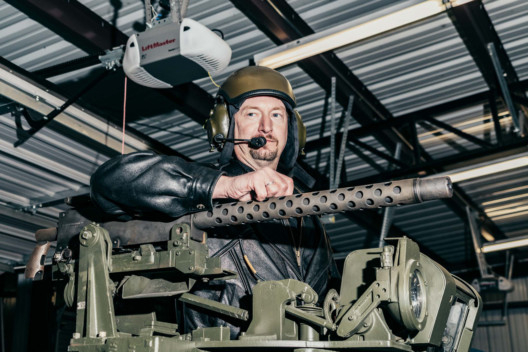
NEW YORK: Over the past decade, patient investors benefited greatly from one of the longest economic expansions in US history, using stocks, gold and even cryptocurrency as vehicles of profit. A few of them even used machine guns.
Yes, machine guns. Not the readily available, semi-automatic rifles that have figured so tragically in recent mass shootings, igniting a national furore over gun laws. We’re talking about actual machine guns, which are about as far from the local gun store inventory as you can get, and much more difficult to buy. A machine gun typically shoots about 600 to 800 rounds a minute, while the Bushmaster AR-15 will fire about 45 rounds a minute, depending on how fast you pull the trigger. Fully automatic firearms are often depicted in movies, but in real life they’re a rare commodity except to members of the military.
Some of the hoops a buyer must navigate to get one mirror what some proponents of tougher gun laws would like for all firearms. But the red tape has also helped make machine guns the ultimate collector’s item, with some having doubled in value over the past 10 years.
Biggest merchant
Frank Goepfert is one of the biggest machine gun merchants in America. From a 100-plus-acre ranch he shares with his wife, son and German shorthair puppy in rural Jasper, Missouri, he runs a small empire of automatic weapons. Inside a tornado-proof vault, dozens of automatic firearms worth millions of dollars hang on the walls. There are Tommy guns, M2 Brownings, Uzis, a Sterling submachine-gun and AK-47 assault rifles, the most popular machine gun in the world.
Goepfert, 47, who regularly sports a leather jacket and a black Stetson, says his company, Midwest Tactical Inc., sold as many as 500 machine guns in 2017, averaging thousands of dollars each. He’s made enough money to purchase two planes and even a tank.
His best customer, a technology company executive, spent $1.6 million on guns last year, while an oil and farming tycoon dropped $1.2 million, he says. By Goepfert’s tally, he has 20 clients who each have spent more than $200,000 on his wares. He declined to identify them, citing privacy considerations. And while the government keeps a record of automatic weapons, it’s not public. That may make Goepfert one of the best sources of information outside the US Bureau of Alcohol, Tobacco, Firearms & Explosives when it comes to who has a machine gun in America. There are “a fixed amount” of such weapons, says ATF Special Agent Joshua Jackson. “Demand has caused the value of these firearms to increase.”
Some of Midwest Tactical’s best-selling models have climbed in value by tens of thousands of dollars since Goepfert and his wife Joy, 45, started the company. According to data collected by the Machine Gun Price Guide, which uses information from dealers, auctions and gun shows, the cost of a Tommy gun (the Thompson M1) went from about $9,000 in 2004 to almost $27,000 last July”-a 200 per cent increase. The Heckler & Koch MP5 soared 250 per cent, from almost $12,000 in 2003 to $42,000. Meanwhile, the MAC10, technically a “machine pistol,” more than doubled in price from 2011 to 2017, to more than $8,000.
Many machine guns held by civilians are war relics brought home by GIs, going back to the Second World War. Goepfert says he once heard of a wealthy widow who - hating her late husband’s collection - let the ATF destroy it. Such firearms need regular attention or they will disintegrate, and Goepfert counts on sellers who don’t want the hassle. The delicate nature of machine guns also helps increase their value. The more guns fall apart, the more valuable those that remain become.
Different roles
When Goepfert switches from purchaser to salesman, his job falls somewhere between gun dealer, money manager and antiquities expert. “We work with a lot of buyers that, you know — they’ll tell us what they’re wanting to collect or invest in and then we go out and try to actually locate a good quality item for them,” he says. “So we work with them and kind of coach them a lot of times.” In addition to making sure the desired firearm is in stock, Goepfert says will pull its price history so a buyer has an idea of what kind of return they will see.
In the past, the machine gun industry saw upticks in sales when the stock market experienced a downturn. “I’ve actually had people pull out of the stock market or real estate when that was going on, and they’ll say, ‘I want to put my money in something different, something a little bit safer,’” he says.
“They might not invest $1 million in machine guns, but part of their investment will probably go there.” One exception was when the price of oil tanked. Midwest Tactical experienced a slide in sales, he says, because many of his clients work in the energy sector.
— Bloomberg












